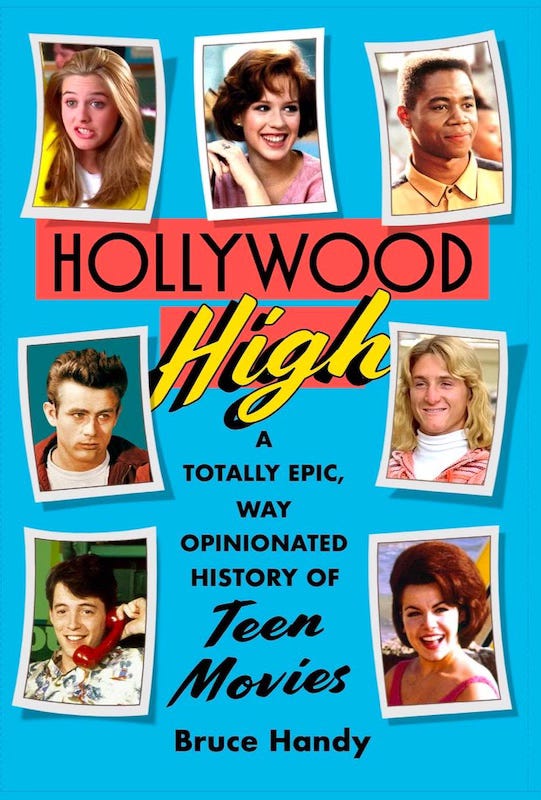Hollywood High: A Totally Epic, Way Opinionated History of Teen Movies by Bruce Handy is my favorite kind of book: smart, funny, full of thoughtful insights and facts about a subject I enjoy. It’s an amiable argument-starter in the way that David Thomson’s books are, though less contentious; you can happily disagree—though I rarely did.
“What’s fun about this subject is that everyone has an informed opinion,” writes Handy. “After all, most of us have never been frontier lawmen, or private eyes, secret agents, Jedi knights, superheroes, fairy-tale princesses, or ex-cons setting off to pull one last heist. If we’re older than twelve, however, we’ve also been (or are) teenagers.”
Hollywood High is not an encyclopedia of teen movies—though your favorite is likely mentioned. Instead, it focuses on some of the most influential ones: Rebel Without a Cause, American Graffiti, Fast Times at Ridgemont High, Clueless, The Hunger Games. The John Hughes movies, and Annette Funicello and Frankie Avalon, as well as the original teen hero, Andy Hardy.
You may recognize Bruce’s byline from Air Mail, The New York Times, The New Yorker, Vanity Fair, Spy, and Vogue. He’s the author of five illustrated books for kids—as well as Wild Things, a wonderful book about reading children’t literature as an adult. We overlapped for almost two years at Esquire during the Jay Fielden era and have remained chums.
I’m thrilled to have him on Dig This for a schmooze about teen movies and the writing this entertaining volume. Check out our video interview above.
Enjoy!
And another thing
I’m always game to reconsider a longstanding belief. In that spirit, I enjoyed Handy’s thoughtful digression on Peggy Sue Got Married, the 1986 Francis Ford Coppola movie. I remember it as a dud, and typical of the disappointment I felt as a young filmgoer in the ’80s. This is from the same man who made The Conversation? How lame is this decade?
Apart from the strangeness of Nic Cage’s performance, a bright, scene-stealing turn by a young Jim Carrey, and Kathleen Turner’s all around gameness, my memories of the movie are unhappy.
The story concerns the middle-aged Peggy Sue (Turner) who passes out at her high school reunion. When she recovers, it’s 1960, and she’s back in school.
Handy writes:
It’s an odd movie that doesn’t quite work, in part because Cage is too eccentric, skewing the central dilemma: Will Peggy Sue marry Charlie—again—even knowing the relationship will turn sour? You don’t get why she’s attracted to this jumpy, antic kid with an adenoidal Jerry Lewis voice in the first place. And Turner, who was thirty-two when the picture came out, is probably too young for the part. The film doesn’t mean to pass her off as a teenager, but an actress who read as a forty something would have heightened the sense of dislocation that I think was the intent. (The device of adults playing teenagers while not hiding their ages works better in the television series Pen15, which walks a thrilling tightrope between ironic distance and cringe-inducing immediacy.)
But it’s fun to see Turner in a majorette uniform, and the uneasy feel of the film has stuck with me ever since it came out, the way it yearns for the past yet renders that past discomfiting—its nostalgia somehow turned, like a corked wine. Maybe you can go home again, as we often do in our dreams, but it will be weird.
Contrary, however, to Ally Sheedy’s famous Breakfast Club line, Peggy Sue’s adult heart hasn’t died; it’s grown and even accrued some wisdom. Kudos to her therapist. Flung back to high school, she’s distraught at moments—who wouldn’t be, forced to take an algebra test for the first time in a quarter century?—anguished at others. For the most part, though, she’a able to maintain a sympathetic but clear-eyed perspective on her own past, even as she relives it.
Handy questions whether his book has managed something similar. The answer is: Yes!
I’m going to stream teen movies this summer. I remember the ones that made an impression on me as a teenager—the John Hughes stuff, of course, and Over the Edge, Breaking Away, Times Square, My Bodyguard, Little Darlings, Taps, Girls Just Want To Have Fun, Bad Boys, Valley Girl, Tex, the two Coppola S.E. Hinton adaptations, Risky Business, the two Savage Steve Holland flicks, Real Genius, River’s Edge, Heathers. I didn’t even like all of them but watched them over and again.
I know Smooth Talk isn’t strictly a teen movie but wow, what a memorable evocation of adolescence.
I haven’t seen Tex in decades. It was the first movie adaptation of an S.E. Hinton novel and the most naturalistic. Directed by Tim Hunter, who wrote Over the Edge and directed River’s Edge. I’d like to see it again.
You know what teen movie I really like? Dick (1999), which not only works as a coming-of-age buddy movie, but a funny political satire. It’s a goof but genuine, and like all great teen movies, it’s got an incredible cast.
We’ve all got our favorites teen movies. What are some of yours?










Share this post